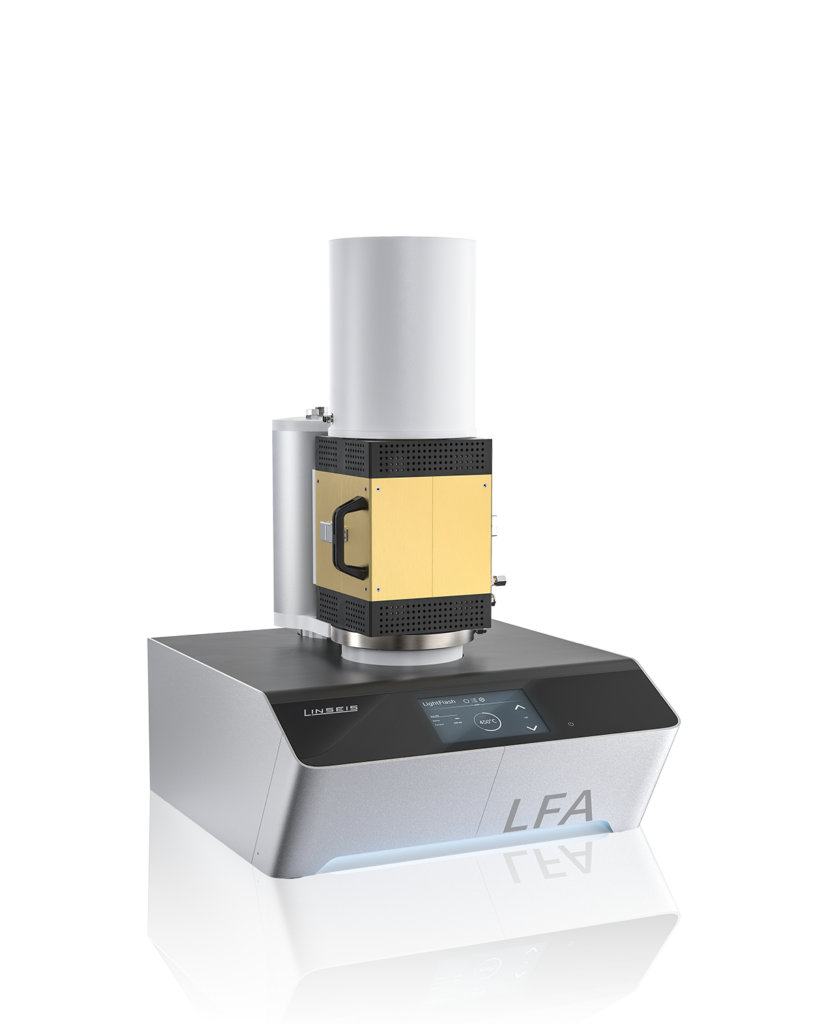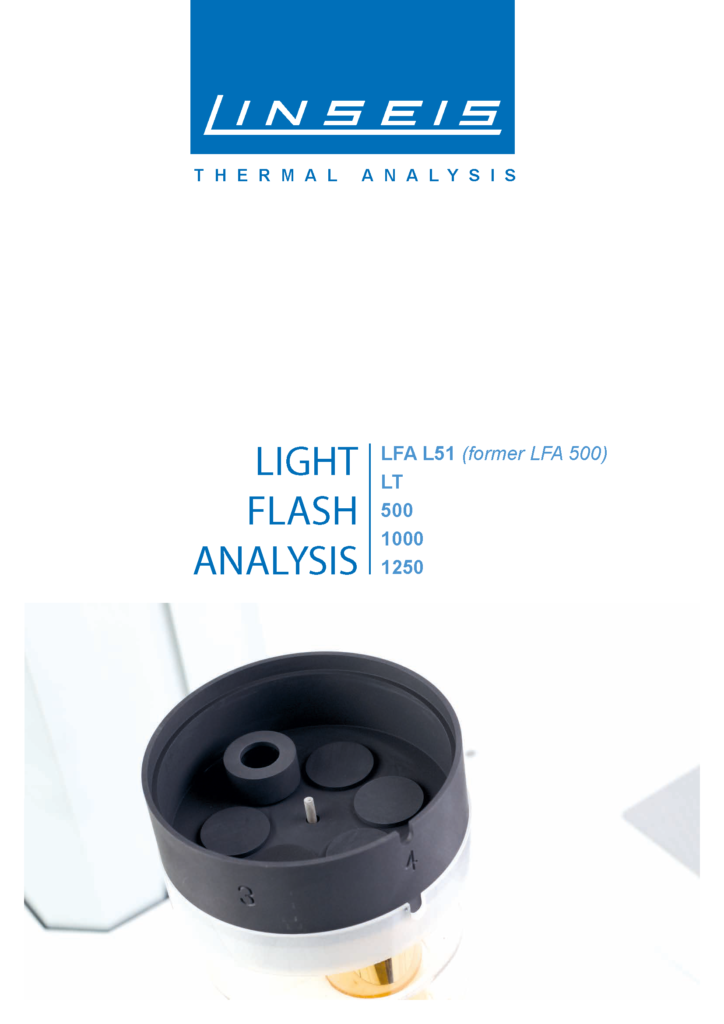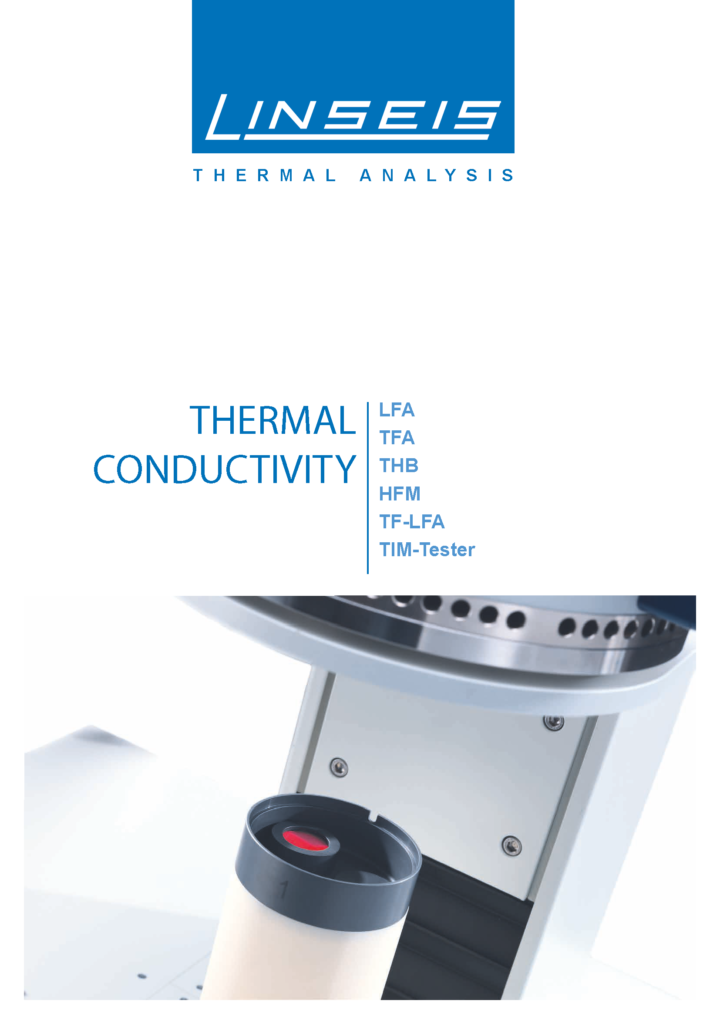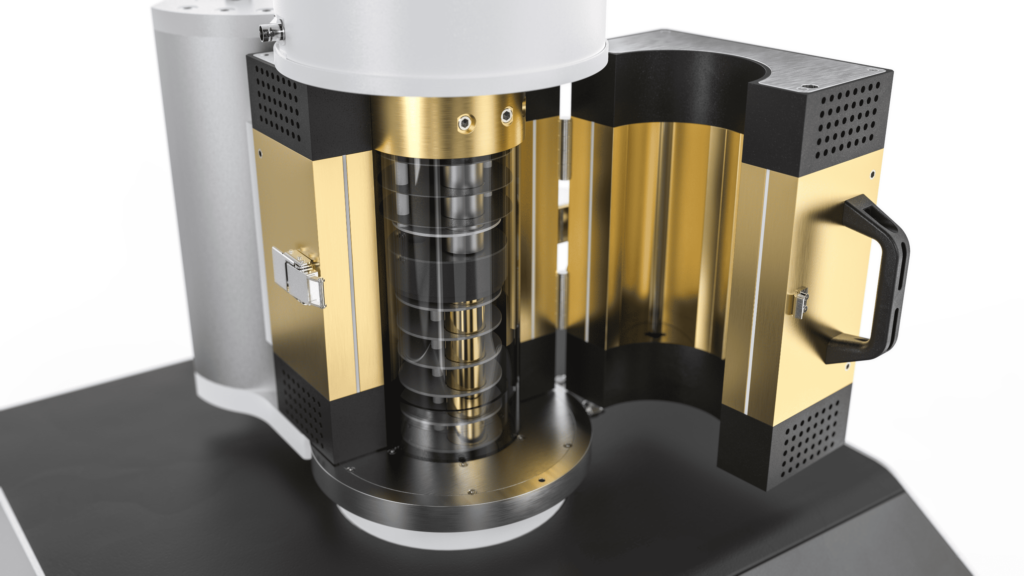Description
To the point
Information about the thermophysical properties of materials and the optimization of heat flows in end products is becoming increasingly important in many industrial applications. In recent decades, the flash method has become the most widely used technique for determining the thermal diffusivity and thermal conductivity of solids, powders and liquids.
The LINSEIS Light Flash LFA L51 series is ideal for determining/measuring the thermal diffusivity, thermal conductivity and specific heat of up to 18 samples in a temperature range from -100 °C to +1250 °C.
Measuring principle:
The sample to be measured is positioned horizontally on the sample carrier / sample changer in an IR or resistance-heated furnace. The furnace heats the sample to a fixed isothermal temperature. The lower side of the sample is then irradiated by a programmed energy pulse using a laser or xenon flashlamp.
This energy pulse leads to a homogeneous temperature rise on the top of the sample, which is measured against time using an infrared detector. The temperature and thermal conductivity can be calculated from this measurement data.
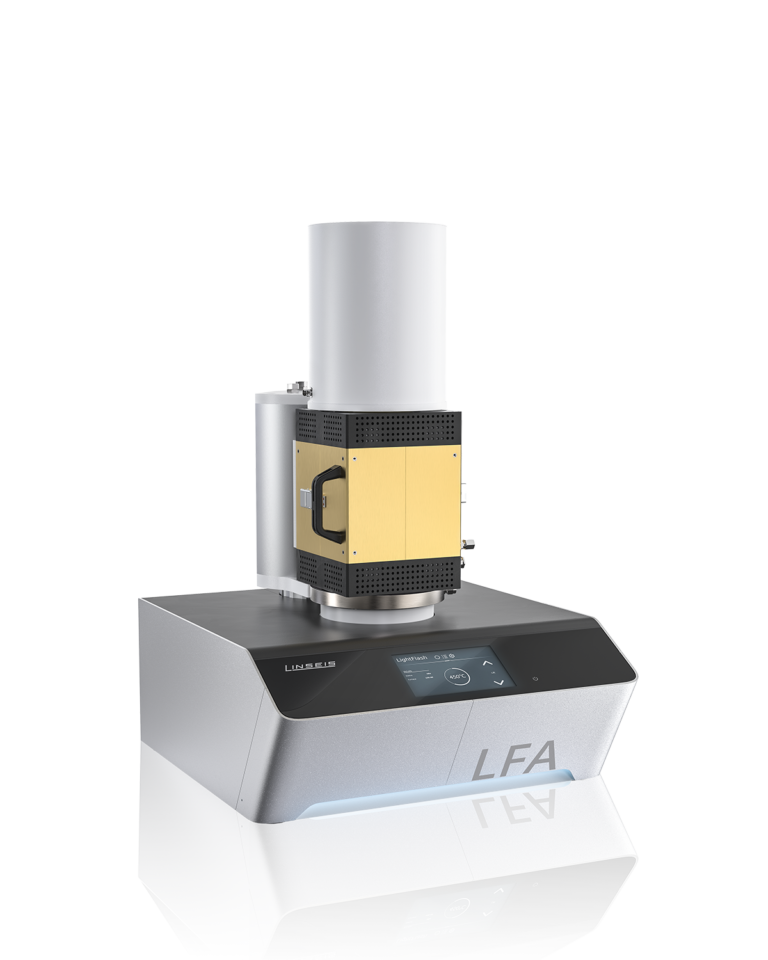
High temperature configuration
The Light Flash Series LFA L51 is available with different furnace options (-100 up to 500°C, RT up to 500/1000°C or 1250°C), ensuring the right temperature range for your application.
Sample Robot
Each Linseis LFA L51 model is equipped with a sample robot for maximum sample throughput. LFA L51 – 500/1000 with up to 18 samples, LFA L51 500/1250 with up to 5 samples.
COMBINED “DUSZA” MODEL
Worlds only combined solution for combined heat loss and finite pulse corrections for the flash method.
One fits all model. No more uncertainty of selecting the appropriate model.
DUSZA – Combined model for Translucent Samples
Accounts for the distinctive problems relating to translucent samples and ensures perfect measurement results.
High Speed IR or Micro-heater furnace
Fast measurements cycling due to very fast heating and cooling rates.
Perfect temperature control with low mass furnace, no measurement error due to temperature fluctuation at sample.
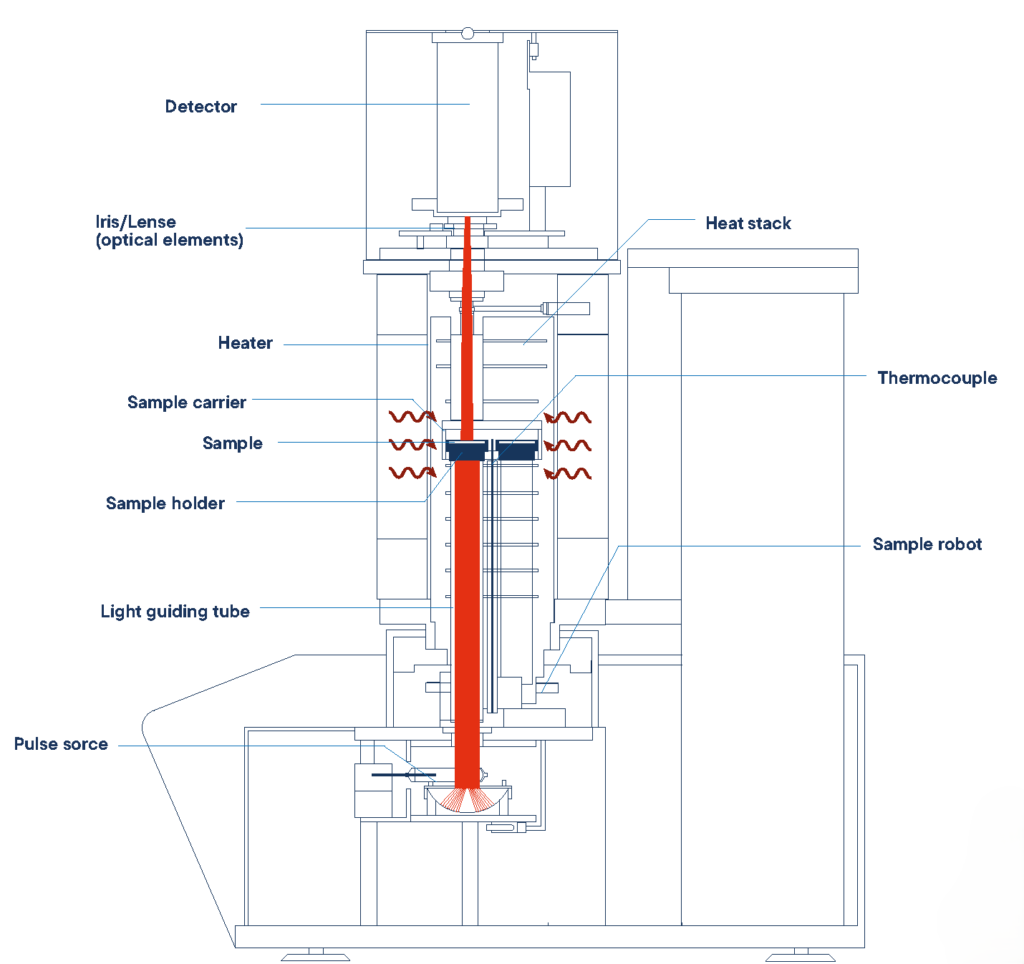
Unique Features
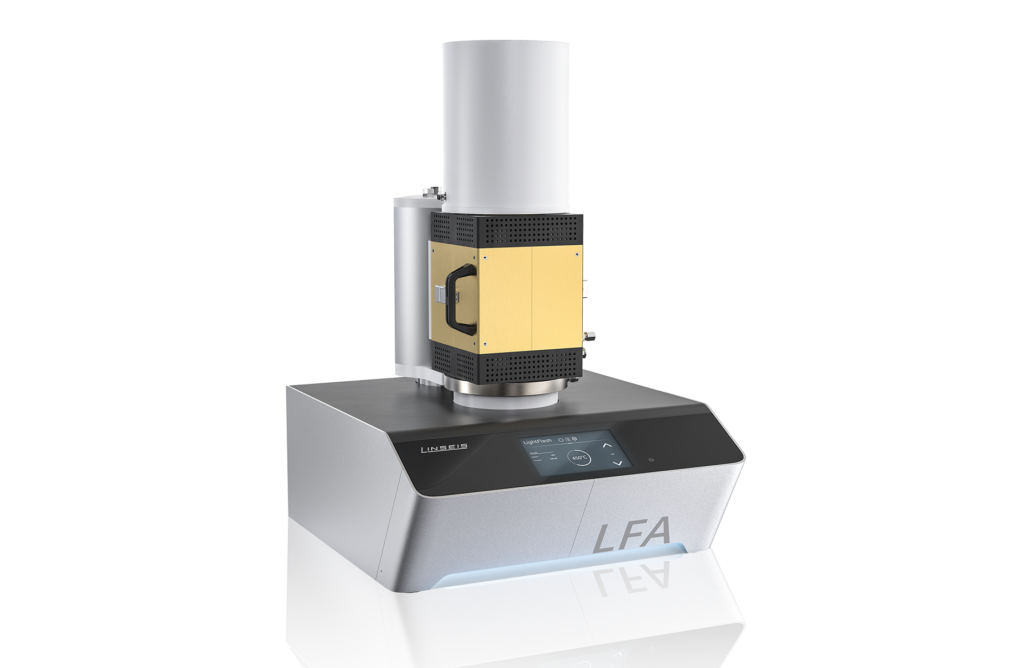
Wide temperature range:
-125°C to 2800°C
High measuring accuracy
and repeatability
Modular design for
flexible customization
Fastest measuring times thanks
to laser/light flash technology
User-friendly software for
comprehensive data
analysis
Suitable for solids,
layers and liquids
Questions? We're just a call away!
+1 (609) 223 2070
+49 (0) 9287/880 0
Our service is available Monday to
Thursday from 8-16 o’clock
and Friday from 8-12 o’clock.
We are here for you!
Specifications
Hard Facts
MODEL | LFA L51 |
|---|---|
| Temperature range*: | -50 to 500°C, -100 to 500 °C, RT up to 500°C / 1000°C / 1250°C |
| Heating rate: | 0.01 up to 100°C/min |
| Pulse source: | Flash lamp, user replaceable |
| Pulse energy: | up to 15J/pulse (variable pulse energy: software-controlled) |
| Energy adjustable: | Yes |
| Measuring range alpha: | 0.01 to 2000 mm2/s |
| Measuring range lambda: | 0.1 to 4000 W/(m∙K) |
| Reproducibility cp: | ±3% (for most materials) |
| Reproducibility alpha: | ±1.9% (for most materials) |
| Accuracy cp: | ±5% (for most materials) |
| Accuracy alpha: | ±2.4% (for most materials) |
| Pulse length: | Software controlled |
| Sample size: | ∅ 3, 6, 10, 12.7 or 25.4 mm rectangular samples 10×10 or 20×20 mm |
| Sensor: | InSb, LN2 cooled |
| Sample thickness: | 0.1 mm ... 6 mm |
| Number of possible samples: | Sample robot for up to 18 samples |
| Sample holder: | metal, SiC, graphite, Al2O3 Variant available for liquids, powders or pastes |
| Atmosphere: | inert, reducing, vacuum |
| Electronics: | integrated |
| Data acquisition: | 2.5 MHz |
| Interface: | USB |
| *Other temperature ranges on request | |
|---|---|
Software
Making values visible and comparable
All thermo analytical devices of LINSEIS are PC controlled, the individual software modules exclusively run under Microsoft® Windows® operating systems. The complete software consists of 3 modules: temperature control, data acquisition and data evaluation. The Linseis software encounters all essential features for measurement preparation, execution and evaluation, just like with other thermo analytical experiments.
LFA Features
- Precise pulse length correction, pulse mapping
- Heat-loss corrections
- Analysis of 2- or 3-layers systems
- Wizard for selection of the perfect evaluation model
- Specific heat determination
- Contact resistance determination in multi-layer systems
- Multi-method analysis: DIL, STA, LSR and LZT
Evaluation Software
- Automatic or manual input of related measurement data (density, specific heat)
- Model wizard for selection of the appropriate model
- Finite pulse correction
- Heat loss correction
- Multilayer model
- Determination of contact resistance
- Cp (Specific Heat) determination by comparative method
Measurement Software
- Easy and user-friendly data input for temperature segments, gases etc.
- Controllable sample robot
- Software automatically displays corrected measurements after the energy pulse
- Fully automated measurement procedure for multi sample measurements
Applications
Application: PTFE “Polytetrafluoroethylene”
PTFE is a versatile material and used in many different industries/applications such as chemical processing and petrochemical sectors: used for vessel linings, seals, spacers, gaskets, well-drilling parts and washers, since PTFE is chemically inert and resistant to corrosion. In this application, a PTFE sample was measured by LFA L51 up to 150°C in inert atmosphere. The thermal conductivity was calculated out of specific heat data and density change data that were recorded by dilatometer and DSC. The values for thermal conductivity are more or less stable over the measured temperature range with an exception at roughly 30°C where a solid-state phase transition takes place.
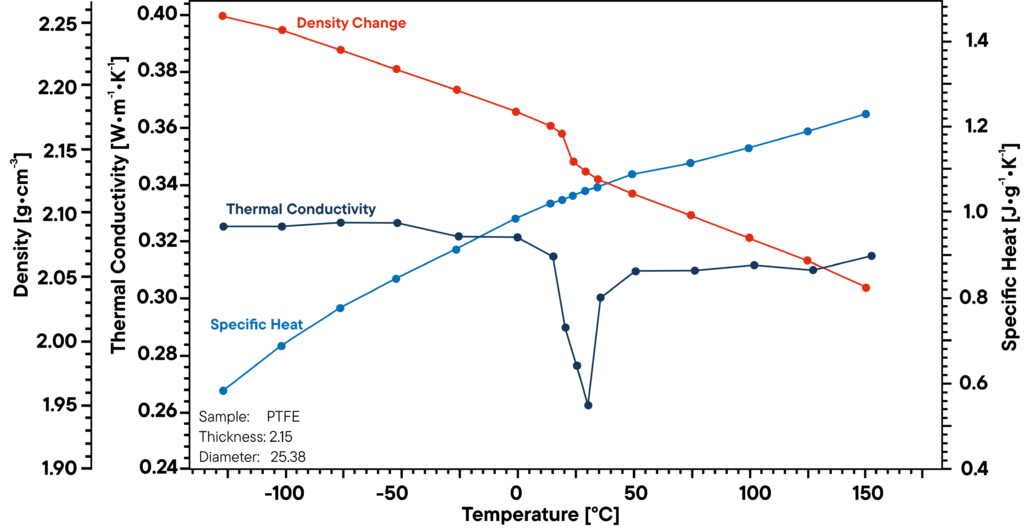
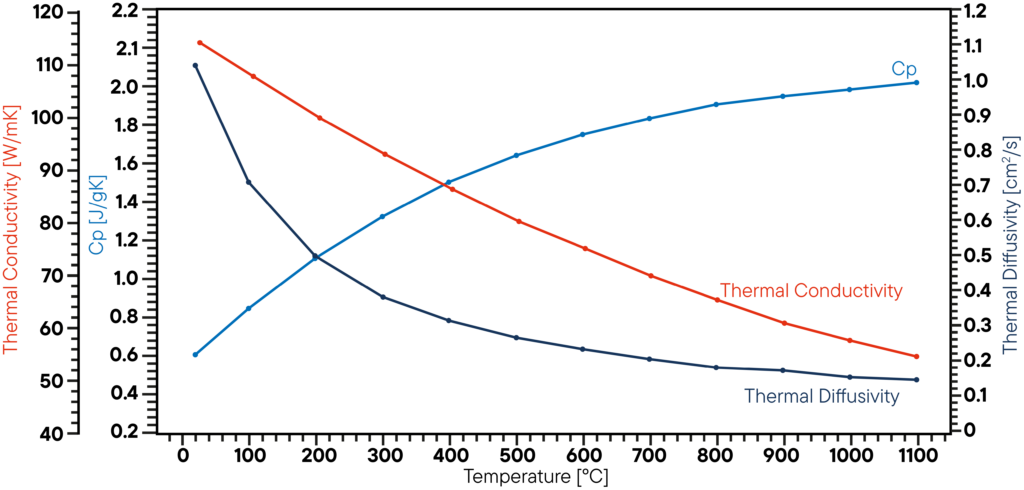
Application: Graphite
Graphite is a carbon species that occurs as a dark grey solid. It has a considerable high chemical resistance and is used in many ways, for example as cathode material, construction material, sensor component and many more. If heated, it reacts with oxygen to carbon monoxide or carbon dioxide, however it can reach very high temperatures if it is heated in inert, oxygen free environment and for this reason it is used in ultra-high temperature furnaces as furnace material or even heater.
In this example, a graphite sample has been analyzed in vacuum using a LFA L52 (Laserflash Analyzer). Thermal diffusivity has been measured directly at several temperature steps between RT and 1100°C. Specific heat capacity has been determined using a known graphite standard in a second sample position as a reference in the same measurement. The product of diffusivity, specific heat and density gives the corresponding thermal conductivity. The result shows a linear decreasing thermal conductivity which is typical and a thermal diffusivity that is showing a plateau above 500°C. The Cp is slightly increasing over temperature.
Application: Reproducibility investigation
Pyroceram, a glass ceramic trademark of Corning used as a standard material in various applications, has been measured using the LFA L51 to show the reproducibility of thermal diffusivity values. In total 18 measurements were performed with 18 samples that were cut out of one bulk block. Each sample was measured separately and the result shows a spread in the result that is in a range of +/- 1 % in a temperature range up to 600°C.
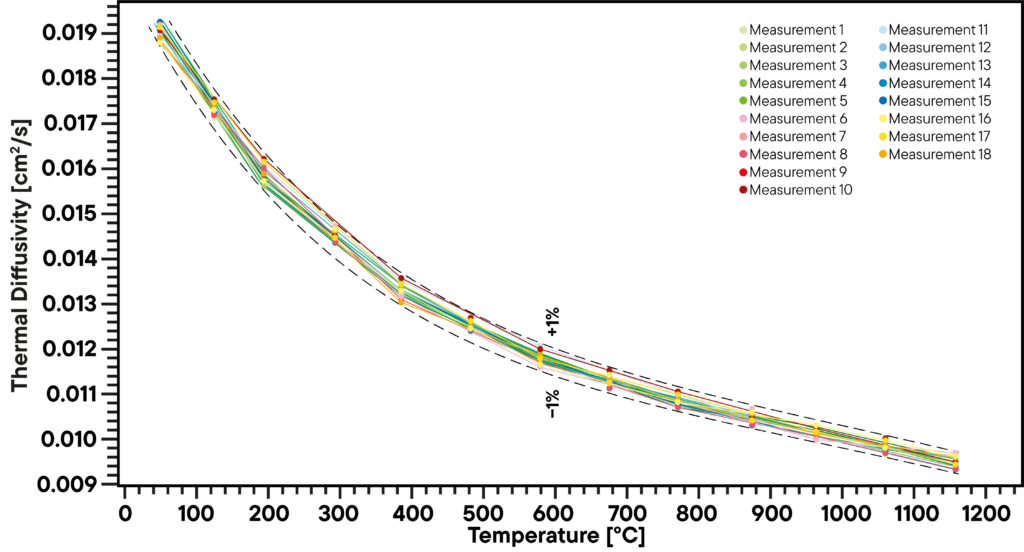
well informed
